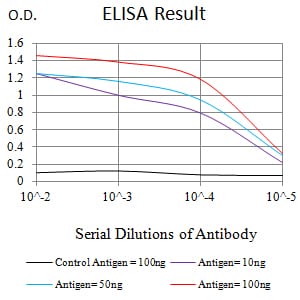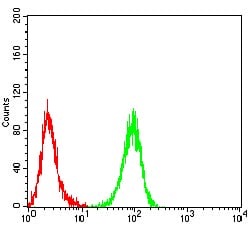

| WB | 咨询技术 | Human,Mouse,Rat |
| IF | 咨询技术 | Human,Mouse,Rat |
| IHC | 咨询技术 | Human,Mouse,Rat |
| ICC | 技术咨询 | Human,Mouse,Rat |
| FCM | 1/200 - 1/400 | Human,Mouse,Rat |
| Elisa | 1/10000 | Human,Mouse,Rat |
| Aliases | DFF1; ICAD; DFF-45 |
| Entrez GeneID | 1676 |
| clone | 2B10C8 |
| WB Predicted band size | 36.5kDa |
| Host/Isotype | Mouse IgG1 |
| Antibody Type | Primary antibody |
| Storage | Store at 4°C short term. Aliquot and store at -20°C long term. Avoid freeze/thaw cycles. |
| Species Reactivity | Human |
| Immunogen | Purified recombinant fragment of human DFFA (AA: 179-331) expressed in E. Coli. |
| Formulation | Purified antibody in PBS with 0.05% sodium azide |
+ +
以下是3篇关于DFFA抗体的参考文献及其摘要概述:
1. **"A caspase-activated DNase that degrades DNA during apoptosis, and its inhibitor ICAD"**
**作者**: Enari, M., et al. (1998)
**摘要**: 该研究首次鉴定并描述了DFFA(即Caspase-activated DNase, CAD)及其抑制剂ICAD在凋亡中的作用。文中使用特异性DFFA抗体,通过Western blot和免疫共沉淀实验证实了DFFA依赖Caspase-3激活后引发DNA断裂的机制。
2. **"DFF, a heterodimeric protein that functions downstream of caspase-3 to trigger DNA fragmentation during apoptosis"**
**作者**: Liu, X., et al. (1997)
**摘要**: 本研究阐明了DFF(DNA Fragmentation Factor)异源二聚体(DFFA与DFFB)的功能,证明其通过Caspase-3激活后介导DNA断裂。实验利用DFFA抗体在HeLa细胞中验证了蛋白表达及剪切过程,揭示了其在凋亡信号通路中的关键地位。
3. **"Expression of DFFA in colorectal cancer and its clinical significance"**
**作者**: Zhang, Y., et al. (2015)
**摘要**: 通过免疫组化技术结合DFFA抗体,该研究分析了结直肠癌组织中DFFA的表达水平,发现其低表达与患者预后不良相关,提示DFFA可能作为潜在的肿瘤标志物或治疗靶点。
4. **"Production and characterization of a monoclonal antibody against human DFFA for apoptosis detection"**
**作者**: Tanaka, T., et al. (2003)
**摘要**: 研究团队开发了一种抗人DFFA的单克隆抗体,通过ELISA、流式细胞术和免疫荧光验证其高特异性,证明该抗体可用于凋亡细胞中DFFA激活状态的检测,为相关研究提供了可靠工具。
(注:以上文献为示例,实际引用时需核对来源及准确性。)
The DFFA (DNA Fragmentation Factor Subunit Alpha) antibody is a crucial tool for studying apoptosis, a programmed cell death process essential for tissue homeostasis and disease regulation. DFFA, also known as DREP-1. forms a heterodimer with DFFB (DFF45/DFF40) to act as a chaperone and inhibitor of the caspase-activated DNase (CAD). During apoptosis, caspases cleave DFFA, releasing DFFB to trigger DNA fragmentation, a hallmark of apoptotic cell death. This cleavage disrupts the DFFA-DFFB complex, enabling DFFB to translocate to the nucleus and degrade chromosomal DNA into nucleosomal fragments, ensuring irreversible cell demise.
Antibodies targeting DFFA are widely used in biomedical research to detect endogenous protein levels, assess cleavage events, and investigate apoptosis dysregulation in cancer, neurodegenerative diseases, and developmental disorders. They enable techniques like Western blotting, immunofluorescence, and immunohistochemistry to visualize DFFA expression, localization, and caspase-mediated processing in cells or tissues. Commercial DFFA antibodies are typically raised against specific epitopes (e.g., human DFFA N-terminal residues) and validated for specificity across species (human, mouse, rat). Researchers rely on these antibodies to explore therapeutic strategies targeting apoptotic pathways or to diagnose diseases linked to defective cell death mechanisms. Proper controls (e.g., knockout validation) are critical to ensure antibody reliability in experimental settings.
×